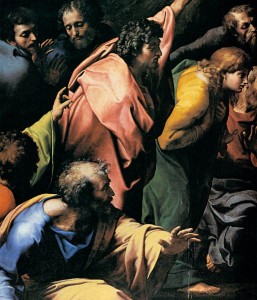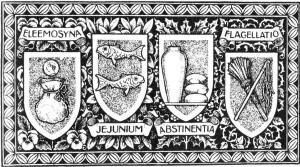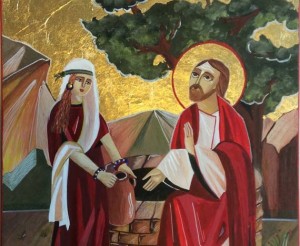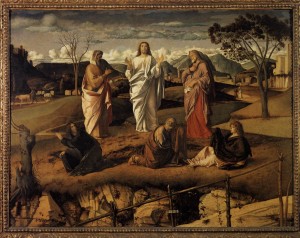Meme by John the BlunderWorker
Tag: lent
Lent is a time for change
 The Great Fast is a time for change. We try to spend more time focused on how to please God and others. When things take us away from God, we can sin. We need to confess our sins to God and change the things that lead us to sin. This is called “repentance.”
The Great Fast is a time for change. We try to spend more time focused on how to please God and others. When things take us away from God, we can sin. We need to confess our sins to God and change the things that lead us to sin. This is called “repentance.”
In the Liturgy we pray “that the rest of our lives may be spent in peace and repentance.” We do that by learning more about the ways of God and then putting them into practice in our lives.
When we think about God’s Commandments we are on the first step to repentance. When we were baptized the priest asked us to renounce Satan and his sinful ways. We promised to serve Christ the Son of God in faith and in truth. When we forget these promises, we sin. But the Lord never forgets His promise to us: “I am with you always, even to the end of the world.”
If we have fallen into sin we can repent and God will raise us up because He is always with us.
QUICK FACTS &THOUGHTS:
• In the Ten Commandments which God gave through Moses the first three concern life with God. Find them in your Bible or prayerbook.
• Do you honor God by praying to Him every day? By not using His name as a swear word? By sharing in the Liturgy every Sunday?
• The rest of the Commandments teach us to respect others. What are these Commandments? • How do you treat your parents? Are you violent with others? Do you take what belongs to others? Do you envy them for what they have?
• In the New Commandment which God gave through Christ we are called to love one another as God loves us. What do you do to show that you love God? That you love others?
• Prepare to go to Confession by loving God and others more during the Great Fast.
(Living with Christ Great Lent at Home)
Transfiguration
 “Jesus took Peter, James, and John
“Jesus took Peter, James, and John
and led them up a high mountain apart by themselves.
And he was transfigured before them…” (Mark 9:2)
Jesus takes them up Mount Tabor, “to show them the full truth about himself, about his divinity, so that they can have hope in eternal life and they remember this experience of divinity, of bliss, of eternity, when it comes time to suffer through the passion. In considering this scene at Tabor, we try to go to Jesus, to look at him, so that we may be enlightened. So that whether we are ill, suffering or dying– or sick and tired– we actually try to discover the Tabors behind the Calvaries” (Fr Javier del Castillo).
This gospel reading is reading twice per year: today on the second Sunday of Lent and in August on the feast of the Transfiguration. Do we recognize that Jesus is the center of our life of faith? Do we recognize that the death and resurrection of Jesus is the ultimate gift given to us that is foretold with this great of event personally experienced by Peter, James and John?
Detail of Raffaella’s “Transfiguration.”
Ash Wednesday
 Ash Wednesday the first day of Lent. On this day, the observance of fast and abstinence begins. Pope St. Leo teaches that the main purpose for fasting is not that the body be deprived of food, but that the mind at the same time be withdrawn from wickedness, we should endeavor during Lent, not only to be temperate in eating and drinking, but especially to lead a modest life, sanctifying the days by persevering prayer and devoutly attending the Church’s liturgy.
Ash Wednesday the first day of Lent. On this day, the observance of fast and abstinence begins. Pope St. Leo teaches that the main purpose for fasting is not that the body be deprived of food, but that the mind at the same time be withdrawn from wickedness, we should endeavor during Lent, not only to be temperate in eating and drinking, but especially to lead a modest life, sanctifying the days by persevering prayer and devoutly attending the Church’s liturgy.
Olivier Clement on Lent
These thoughts of an esteemed theologian, Olivier Clement seem worth sharing on season of Lent:
“Asceticism can only be understood in the perspective of the resurrected, liturgical body. Asceticism signifies the effort to strip away our masks, those neurotic identities that usurp our personal vocation. It is an effort based not on will-power, but on a ceaseless abandonment of oneself to grace…. Asceticism is the struggle, the self-abandonment of openness and faith, which allows the Spirit to transform the anonymous body of our species into a body of ‘language’ that expresses both the person and communion among persons. Thanks to this ascetic struggle, we are gradually transformed from an acquisitive body, that treats the world as its prey, into a body of celebration, that unites itself to the ecclesial liturgy and thereby to the cosmic liturgy.”
Olivier Clement (1921-2009) was a French Eastern Orthodox theologian 1921-2009. He was a Professor at St.Serge in Paris and the author of many books and articles and was the editor of the magazine Contacts.
Laetare Sunday
Today, the 4th Sunday of Lent–Laetare Sunday we here from the gospel of Saint John (3:14-21). One among several sentences from the gospel stand out: “Whoever believes in him will not be condemned, but whoever does not believe has already been condemned, because he has not believed in the name of the only Son of God.” It is the Son of God who saves me from me and offers me a terrific gift: heaven.
A reflection from Saint John Chrysostom gives persepctive: “The text, ‘God so loved the world’, shows such an intensity of love. For great indeed and infinite is the distance between the two. The immortal, infinite majesty without beginning or end loved those who were but dust and ashes, who were loaded with ten thousand sins but remained ungrateful even as they constantly offended him. This is who he ‘loved’! For God did not give over a servant, or an angel or even an archangel but ‘his only begotten Son.’ And yet no one would show such anxiety even for his own child as God did for his ungrateful servants.”
The Big Three of Lent
I saw this post the other day, “The Big Three of Lent.” Thought I would share:
Fasting is not just a spiritual diet. By denying our bodies, our physical hunger reminds us of the hunger of our souls for God, our longing for a deeper relationship with Our Lord.
Almsgiving teaches us to separate ourselves from material possessions. By freely giving of our money and possessions we learn to trust the Lord more deeply for our own daily needs.
Prayer during Lent is a way to stir up our love and enthusiasm by having a deepening conversation with the Almighty. Remember that the light of God’s love shines more brightly in the darkness of the recognition of our own sinfulness.
Third Sunday of Lent
 In many parishes with an active and faithful Rite of Christian Initiation of Adults (RCIA) program you would have celebrated the first of three scrutiny rites. The gospel reading would have been the story of the Woman at the Well. This particular bible narrative shows the intimacy and mercy of God in the life of a woman in great need. The gaze of Christ is what heals because he names the sin and disorder, calls the woman to drink of refreshing water and heals her name.
In many parishes with an active and faithful Rite of Christian Initiation of Adults (RCIA) program you would have celebrated the first of three scrutiny rites. The gospel reading would have been the story of the Woman at the Well. This particular bible narrative shows the intimacy and mercy of God in the life of a woman in great need. The gaze of Christ is what heals because he names the sin and disorder, calls the woman to drink of refreshing water and heals her name.
A scrutiny is a liturgical rite of the Church which occurs on the Third, Fourth, and Fifth Sundays of Lent. Those receiving Baptism, Confirmation and Eucharist would participate in these rites at the Sunday Eucharist. The scrutinies lead all of us to a deeper change-of-life by looking at oneself and working on repentance of sin. There are special prayers of exorcism. We typically think of an exorcism for those who are possessed by the devil in some outrageous way. But an exorcism is used to be delivered from evil, sin, weakness of will and mind, and disorder. All sin needs to be exorcised; sin comes from the devil.
The rites of exorcism are meant for healing and turning the person from sin so that the person can live in the light. The goal is to set one’s life aright with God. No good Christian can be in relationship with God and with Satan. Hence, the rites of the RCIA scrutinies aim is to deepen their resolve to hold fast to Jesus Christ, and to give definition to their decision to love God above all things for all time. Likewise, the scrutinies hope to protect those preparing for Easter Sacraments against temptation, and to give them strength in Jesus Christ.
The prayer of the Church is for a true conversion of life for the sake of the Gospel during this Lenten season.
Knowing the Lord as the Apostles
 We are the 2nd Sunday of Lent and the magnificently rich reading from the Gospel of Mark (9:2-10) on the Transfiguration.
We are the 2nd Sunday of Lent and the magnificently rich reading from the Gospel of Mark (9:2-10) on the Transfiguration.
“Jesus took Peter, James, and John and led them up a high mountain apart by themselves. And he was transfigured before them, and his clothes became dazzling white, such as no fuller on earth could bleach them.”
One thing is certain: we can stand looking at the Lord with mouths open; we have to listen to him. Abraham had his vision of God, and listened; Mt. Tabor was the place where Peter, James and John had a unique witness a vision of God. What is your vision of God? What has God said to you today?
Saint Leo the Great reflects:
“The splendor of the Transfiguration clearly and unmistakably reveals the one who had been promised by signs foretelling him under the veil of mystery. As St. John says, ‘The law was given through Moses, grace and truth came through Jesus Christ.’ In him the promise made through the shadows of prophecy stands revealed, along with the full meaning of the precepts of the law. He is the one who teaches the truth of prophecy through his presence, and makes obedience to the commandments possible through grace… When it comes to obeying the commandments or enduring adversity, the words uttered by the Father should also echo in our ears: ‘This is my beloved Son in whom I am well pleased. Listen to him.’”
The meaning of Christ’s temptation
St. Augustine reflects on Mark 1:12-15, today’s gospel in the Novus Ordo:
“Jesus made us one with him when he chose to be tempted by Satan. We’ve heard in the gospel how the Lord Jesus Christ was tempted by the devil in the desert. Certainly Christ was tempted by the devil. In Christ you were tempted, for Christ received his flesh from your nature, but by his own power gained salvation for you; he suffered death in your nature, but by his own power gained life for you; he suffered insults in your nature, but by his own power gained glory for you; therefore, he suffered temptation in your nature, but by his own power gained victory for you.”
